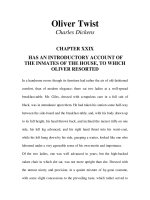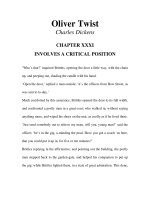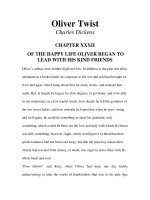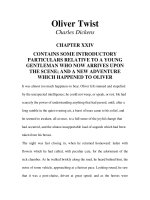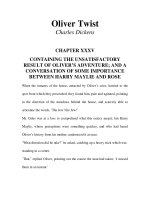Tài liệu LUYỆN ĐỌC TIẾNG ANH QUA TÁC PHẨM VĂN HỌC-Pride and Prejudice -Jane Austen -Chapter 41 pdf
Bạn đang xem bản rút gọn của tài liệu. Xem và tải ngay bản đầy đủ của tài liệu tại đây (27.57 KB, 10 trang )
Pride and Prejudice
Jane Austen
Chapter 41
The first week of their return was soon gone. The second began. It was the
last of the regiment’s stay in Meryton, and all the young ladies in the
neighbourhood were drooping apace. The dejection was almost universal.
The elder Miss Bennets alone were still able to eat, drink, and sleep, and
pursue the usual course of their employments. Very frequently were they
reproached for this insensibility by Kitty and Lydia, whose own misery was
extreme, and who could not comprehend such hard-heartedness in any of the
family.
‘Good Heaven! what is to become of us? What are we to do?’ would they
often exclaiming the bitterness of woe. ‘How can you be smiling so, Lizzy?’
Their affectionate mother shared all their grief; she remembered what she
had herself endured on a similar occasion, five-and-twenty years ago.
‘I am sure,’ said she, ‘I cried for two days together when Colonel Miller’s
regiment went away. I thought I should have broken my heart.’
‘I am sure I shall break MINE,’ said Lydia.
‘If one could but go to Brighton!’ observed Mrs. Bennet.
‘Oh, yes!—if one could but go to Brighton! But papa is so disagreeable.’
‘A little sea-bathing would set me up forever.’
‘And my aunt Phillips is sure it would do ME a great deal of good,’ added
Kitty.
Such were the kind of lamentations resounding perpetually through
Longbourn House. Elizabeth tried to be diverted by them; but all sense of
pleasure was lost in shame. She felt anew the justice of Mr. Darcy’s
objections; and never had she been so much disposed to pardon his
interference in the views of his friend.
But the gloom of Lydia’s prospect was shortly cleared away; for she
received an invitation from Mrs. Forster, the wife of the colonel of the
regiment, to accompany her to Brighton. This invaluable friend was a very
young woman, and very lately married. A resemblance in good humour and
good spirits had recommended her and Lydia to each other, and out of their
THREE months’ acquaintance they had been intimate TWO.
The rapture of Lydia on this occasion, her adoration of Mrs. Forster, the
delight of Mrs. Bennet, and the mortification of Kitty, are scarcely to be
described. Wholly inattentive to her sister’s feelings, Lydia flew about the
house in restless ecstasy, calling for everyone’s congratulations, and
laughing and talking with more violence than ever; whilst the luckless Kitty
continued in the parlour repined at her fate in terms as unreasonable as her
accent was peevish.
‘I cannot see why Mrs. Forster should not ask ME as well as Lydia,’ said
she, ‘Though I am NOT her particular friend. I have just as much right to be
asked as she has, and more too, for I am two years older.’
In vain did Elizabeth attempt to make her reasonable, and Jane to make her
resigned. As for Elizabeth herself, this invitation was so far from exciting in
her the same feelings as in her mother and Lydia, that she considered it as
the death warrant of all possibility of common sense for the latter; and
detestable as such a step must make her were it known, she could not help
secretly advising her father not to let her go. She represented to him all the
improprieties of Lydia’s general behaviour, the little advantage she could
derive from the friendship of such a woman as Mrs. Forster, and the
probability of her being yet more imprudent with such a companion at
Brighton, where the temptations must be greater than at home. He heard her
attentively, and then said:
‘Lydia will never be easy until she has exposed herself in some public place
or other, and we can never expect her to do it with so little expense or
inconvenience to her family as under the present circumstances.’
‘If you were aware,’ said Elizabeth, ‘of the very great disadvantage to us all
which must arise from the public notice of Lydia’s unguarded and imprudent
manner—nay, which has already arisen from it, I am sure you would judge
differently in the affair.’
‘Already arisen?’ repeated Mr. Bennet. ‘What, has she frightened away
some of your lovers? Poor little Lizzy! But do not be cast down. Such
squeamish youths as cannot bear to be connected with a little absurdity are
not worth a regret. Come, let me see the list of pitiful fellows who have been
kept aloof by Lydia’s folly.’
‘Indeed you are mistaken. I have no such injuries to resent. It is not of
particular, but of general evils, which I am now complaining. Our
importance, our respectability in the world must be affected by the wild
volatility, the assurance and disdain of all restraint which mark Lydia’s
character. Excuse me, for I must speak plainly. If you, my dear father, will
not take the trouble of checking her exuberant spirits, and of teaching her
that her present pursuits are not to be the business of her life, she will soon
be beyond the reach of amendment. Her character will be fixed, and she will,
at sixteen, be the most determined flirt that ever made herself or her family
ridiculous; a flirt, too, in the worst and meanest degree of flirtation; without
any attraction beyond youth and a tolerable person; and, from the ignorance
and emptiness of her mind, wholly unable to ward off any portion of that
universal contempt which her rage for admiration will excite. In this danger
Kitty also is comprehended. She will follow wherever Lydia leads. Vain,
ignorant, idle, and absolutely uncontrolled! Oh! my dear father, can you
suppose it possible that they will not be censured and despised wherever
they are known, and that their sisters will not be often involved in the
disgrace?’
Mr. Bennet saw that her whole heart was in the subject, and affectionately
taking her hand said in reply:
‘Do not make yourself uneasy, my love. Wherever you and Jane are known
you must be respected and valued; and you will not appear to less advantage
for having a couple of—or I may say, three—very silly sisters. We shall
have no peace at Longbourn if Lydia does not go to Brighton. Let her go,
then. Colonel Forster is a sensible man, and will keep her out of any real
mischief; and she is luckily too poor to be an object of prey to anybody. At
Brighton she will be of less importance even as a common flirt than she has
been here. The officers will find women better worth their notice. Let us
hope, therefore, that her being there may teach her her own insignificance.
At any rate, she cannot grow many degrees worse, without authorising us to
lock her up for the rest of her life.’



